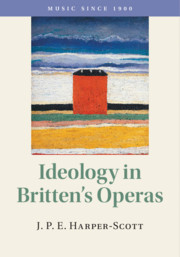3 - From Manifest Violence to its Historical Sediment
from PART II - THE SHIP OF STATE
Published online by Cambridge University Press: 04 September 2018
Summary
I remember Jameson's remark (from a private conversation) that, in a revolutionary process, violence plays a role homologous to that of wealth in the Protestant legitimization of capitalism: although it has no intrinsic value (and, consequently, should not be fetishized and celebrated for itself, as in the Fascist fascination with it), it serves as a sign of the authenticity of our revolutionary endeavour. When the enemy resists and engages us in a violent conflict, this means that we effectively touched its raw nerve …
Slavoj 2izek, ‘Jameson as a Theorist of Revolutionary Philately'As Violent as Star Clusters
When human characters do not fit their ideological boots in a Britten opera, they are slashed, beaten, suffocated, or humiliated until they do. Peter Grimes strikes Ellen Orford when she touches his raw nerve ('Peter! We've failed, We've failed.’). Ellen's verbal blow is thus met by a physical one from Peter, just as the Borough's terrifying threat to murder him is rebutted by his own suicide. Similarly, a father's smack to the head kills the recalcitrant Wingrave boy in Owen Wingrave's ‘ballad', and again this violence is an answer in the form of an echo: the boy's decision not to fight having arisen from his own head, the father's response, redoubling the violence, is to strike back at the body part (the head) which had originated the assault on family virtue. When Lucretia is raped, she responds to the violence which, in her ancient Roman context, is an attack on her chastity as well as her body, with an act of suicidal violence. Her death, she feels, will violently restore her lost chastity in the same moment that it destroys the body whose ‘ownership’ the rapist Tarquinius has partially wrested from her husband. And in The Turn of the Screw, the tear in the social fabric of Bly which results from the boy Miles's ambiguous declaration of his sexual precocity is rejoined by his curious death, smothered in the embrace of a Governess who will not accept his monstrosity.
- Type
- Chapter
- Information
- Ideology in Britten's Operas , pp. 69 - 110Publisher: Cambridge University PressPrint publication year: 2018

